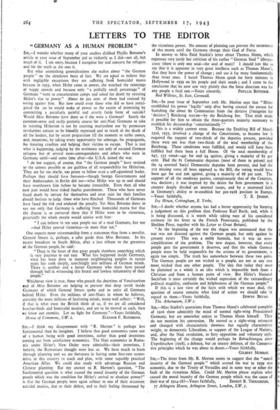GERMANY AS A HUMAN PROBLEM " .
LETTERS TO THE EDITOR
Sta,—I wonder whether many of your readers disliked Phyllis Bottome's article in your issue of September 3rd as violently as I did—not all, but much of it. I am sorry, because I recognise her real concern for refugees and for the truth as she sees it.
But what astonishing generalisations she makes about " the German people " on the slenderest basis of fact. We are asked to believe that with negligible exceptions they are suffering fronl homicidal mania because in 1933, when Hitler came to power, she watched the rejoicings of happy crowds and because only " a pitifully small percentage " of Germans " went to concentration camps and asked for death by resisting Hitler's rise to power." About 6o per cent. of them had resisted by voting against him. But how could even those who did so have antici- pated the Ise he would make of power to the extent of protesting by committing a peculiarly painful and utterly futile form of suicide? Would Miss Bottome have done so if she were a German? Surely the common-sense and, really patriotic course for anti-Nazi Germans to take in resisting Hitlerism is not by courting martyrdom nor by premature revolutions certain to be bloodily repressed and to result in the death of all the leaders, but by secret preparation till the moment to strike comes, and, meantime, by taking every opportunity for sabotage, for propaganda, for resisting cruelties and helping their victims to escape. That is just what is happening, judging by the testimony not only of escaped German refugees but of several news-correspondents and others who were in Germany until—and some time after—the U.S.A. joined the war.
T do not suggest, of course, that " the German people " have resisted to the utmost possible or are guiltless of all responsibility for Hitlerism. They are far too docile, too prone to follow even a self-appointed leader. Perhaps they should have foreseen—though foreign Governments and their Ambassadors in Berlin did not—what Hitler was up to and should have overthrown him before he became irresistible. Even then all who took part would have risked fearful punishment. Those who have never faced death by torture for themselves and utter ruin for their families should hesitate to judge those who have flinched. Thousands of Germans have faced the risk and endured the penalty. Yet Miss Bottome dares to say not only that Germany is suffering from homicidal mania but that the disease is so universal there that if Hitler were to be victorious, practically the whole people would rejoice with him: a I can believe in ten sane people out of a mad Germany, but not —had Hitler proved victorious—in more than ten."
One expects more statesmanship from a statesman than from a novelist. General Smuts is, perhaps, a safer guide than Miss Bottome. In his recent broadcast to South Africa, after a just tribute to the greatness of the German people, he said: "Deep in the heart of that great people slumbers something which is very precious to our race. What has happened inside Germany, • what has been clone to innocent neighbouring peoples in recent years has sunk deeply, scorchingly into millions of German minds. There is another and a better Germany who must have passed through hell in witnessing this brutal and lawless inhumanity of their people.
Whichever view is true, those who preach the doctrines of Vansittartism and of Miss Bottome are helping to prevent' that deep revolt inside Germany of which General Smuts spoke and to unite all Germans behind Hitler. Even the millions of anti-Nazis in whom he believes, certainly the more millions of hesitating minds, many well reflect: " Well, if that is what even the British think of us, if we are all considered butcher-birds and homicidal maniacs, and are to be treated as such, then we know our enemies. Let us fight for Germany."—Yours faithfully,


























 Previous page
Previous page